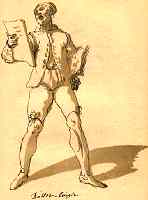A pitiful ballad
"A Sonnett upon the pittiful burneing of the Globe playhowse in London"
This fearful fire began above,
A wonder strange and true,
And to the stage-house did remove,
As round as tailor's clew*;
And burnt down both beam and snag*,
And did not spare the silken flag.
Oh sorrow, pitiful sorrow, and yet all this is true.
Out run the knights, out run the lords,
And there was great ado;
Some lost their hats, and some their swords;
Then out run Burbage* too;
The reprobates, though drunk on Munday*,
Prayed for the Fool and Henry Condye*.
Oh sorrow, &c.
The periwigs and drum-heads* fry
Like to a butter firkin*;
A woeful burning did betide
To many a good buff jerkin*.
Then with swollen eyes, like drunken Flemmings*,
Distressed stood old stuttering Heminges*.
Oh sorrow, &c.
No shower his rain did there down force
In all that Sunshine weather,
To save that great renowned house;
Nor thou, O ale-house, neither.
Had it begun below, sans doubt,
Their wives for feare had pissed it out.
Oh sorrow, &c.
Footnotes
-
A glossary
- Clew
- A spool of thread; the Globe was round.
- Snag
- A projecting beam.
- Burbage
- The principal actor of Shakespeare's company, the King's Men, and one of the major shareholders.
- Munday
- A pun on "Monday" and Anthony Munday, a minor dramatist of the period.
- The Fool and Henry Condye
- At this stage in the career of the King's Men, the fool was Robert Armin; Henry Condell was a shareholder and one of the publishers of the First Folio.
- Periwigs and drum-heads
- Gentry, wearing wigs, and bald-headed people.
- Firkin
- A small barrel in which salted butter was stored.
- Buff jerkin
- A leather jacket.
- Flemmings
- A generic term for inhabitants of Holland and Flanders; they were considered to be great ale drinkers.
- Heminges
- Heminge was business manager for the Globe Theatre.
